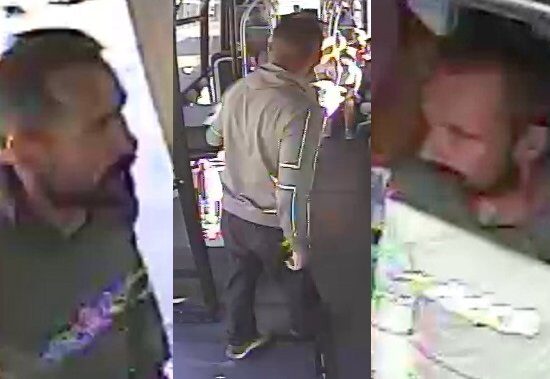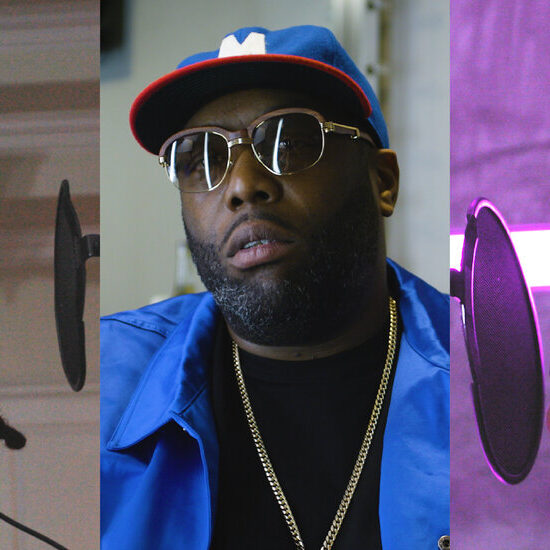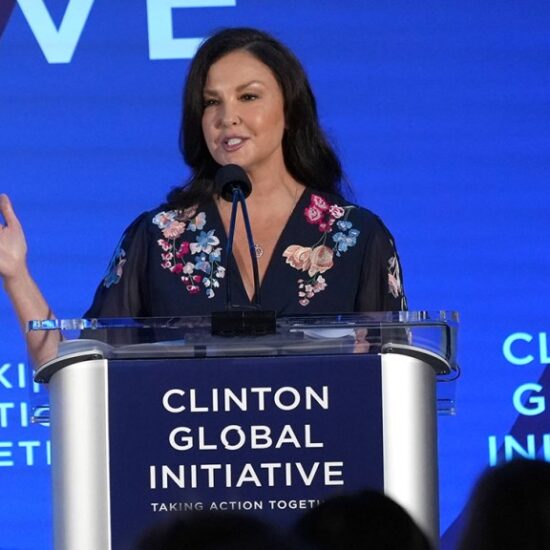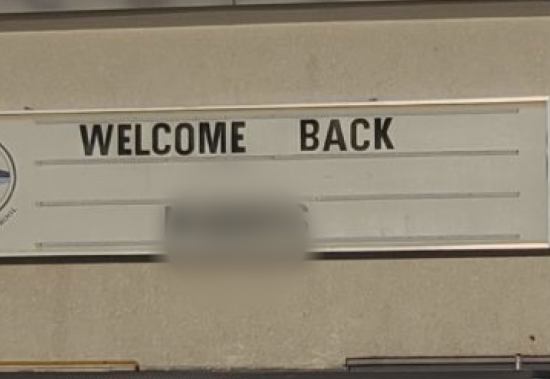
By all accounts, Mariel Semonte Orr was a natural-born leader — intelligent and level-headed, with a scene-stealing personality. Orr, also known as the Atlanta rapper Trouble, deserved a shot at rap’s big leagues, and nearly everyone who spoke for this article believed he would have soon received it.
In the early hours of June 5, Orr was shot and killed during what police say was a domestic dispute in the Atlanta suburb of Conyers. He died at a nearby hospital hours later at age 34, before friends, fans and family would see him realize his full potential.
A month after Orr’s death, close friends and associates gathered at the corner of Norfolk Street and North Avenue to remember him. The group included rappers YB, Suwop, and Freeworld, all affiliated with Trouble’s MMB record label. The three men, all in their early-to-mid twenties, said Orr helped them build self-confidence and advised them to value relationships more than making money. Friends Doris Turner and MMB Smoke spoke of Trouble’s push for financial literacy to friends through a group chat, where he shared what he was learning about investing.
Queen, the sister of deceased Atlanta rapper Shawty Lo, says Orr had a knack for bringing people together. “He was able to get the young boys to not do the nonsense in the streets, and come do something positive with him,” she tells Rolling Stone. And MMB Thuglife, a 23-year-old rapper, says Orr steered him away from a turbulent path that included an attempted murder case. “He’s supported me through the jail shit and the street shit, being a real big brother,” he says.
Atlanta does seem different right now. Recent deaths, acts of violence and legal scandals have rocked the city’s hip-hop community. This includes the high-profile shooting deaths of Trouble, Atlanta rapper Archie Eversole, and the mother of famed trap music producer Metro Boomin.
Eversole, whose 2002 hit “We Ready” evolved into a popular hype song for sporting events, was shot in the jaw on March 25, and died nine days later at age 37. Police have claimed he was killed by his own brother. And Leslie Joanne Wayne, who Metro Boomin called his “biggest inspiration,” was killed by her partner in early June in an apparent murder-suicide.
Also disturbing Atlanta’s sense of order was the arrest of 28 affiliates of the Atlanta rapper’s YSL collective, including Young Thug being taken into custody on May 9 and Gunna surrendering to authorities two days later. Their arrests were followed less than a week later by the nonviolent death of YSL rapper Lil Keed.
Booking photo of Young Thug, who was one of 28 people indicted in May on conspiracy to violate the state’s RICO act and street gang charges.
Fulton County Sheriff’s Office via AP
The YSL crew, identified by Atlanta law enforcement as a street gang called Young Slime Life but known to fans as an abbreviation for Thug’s Young Stoner Life record label, is facing a 56-count RICO case. Several YSL-affiliated rappers have also been ensnared in the case, including Gunna, Yak Gotti and Thug’s older brother Quantavious Grier, a.k.a Unfoonk. Grier was released from prison in 2019 after spending 11 years of a life sentence after being convicted in 2007 for felony murder and armed robbery.
Almost all of the defendants in the RICO case are charged with conspiracy, with many others accused of participation in a criminal street gang. Some, such as Yak Gotti and four others, are accused of murder, while others have lesser counts such as possession of controlled substances and weapons possession. It is also alleged that YSL affiliate Christian Eppinger, a.k.a. Big Bhris, shot an Atlanta police officer six times in February. Eppinger faces 15 charges in the RICO case, including attempted murder.
The YSL RICO case is also noteworthy for its relationship to rapper YFN Lucci, who is currently being held in a Fulton County jail on RICO charges. Lucci faces a murder charge from a December 2020 incident, when an Atlanta man was killed during a drive-by shooting in which Lucci is alleged to have participated. Young Thug is accused by prosecutors of giving YSL affiliates permission to murder Lucci behind bars. Earlier this year, Lucci says he was stabbed in jail.
Adding to the controversy is the prosecution’s use of Young Thug’s lyrics in songs such as “Ski,” “Slatty” and others as potential evidence in the case. The D.A.’s office even claims in the song “Bad Boy,” featuring the late artist Juice WLRD, that Thug alluded to personally shooting at Lucci’s mother, who was hit in the leg when her house was reportedly shot up twice in a week.
When news broke that longtime Ludacris manager Chaka Zulu was shot on June 26 outside a lounge in Atlanta’s wealthy Buckhead neighborhood, some of the city’s most prominent industry leaders began to feel that Atlanta was in crisis. Eversole, Lucci, Thug, Gunna, Trouble and Zulu have all been sidelined in incidents related to violence. As they wrestle with what to do, there are different positions on the way forward.
“You got these young boys trying to live up to what these rappers are talking about” – Omeretta the Great
Antonio “L.A.” Reid, who co-founded Atlanta’s venerable LaFace Records with Kenneth “Babyface” Edmonds in 1989, lives in Los Angeles but is still considered a godfather figure of Atlanta’s music industry. He visits Atlanta often on business, and never felt unsafe living in Atlanta in the 1990s, but began feeling different in recent months. He first noticed police guarding Atlanta’s Waldorf Astoria during a recent stay. “That concerned me because that’s not how I remember Atlanta,” he tells Rolling Stone.
Reid was deeply disturbed by the shooting of Zulu, who he calls “one of the nicest guys I’ve ever met.” He called it a sign that not-so-positive change was in the air.
“Chaka Zulu is not a street guy. He’s not a troublemaker,” he says. “He’s a good man. And that really made me question Atlanta for the first time.”
The 1990s were a golden era for LaFace, and Atlanta. It was a sustained period of economic growth in the U.S., and a global moment in the spotlight for the city, which hosted the 1996 summer Olympic Games. Atlanta’s music industry machine was also smaller, yet capable of creating worldwide celebrities from Kris Kross and TLC and Pink to Usher and OutKast. With each crossover success story, Atlanta solidified its place as an alternative to New York and Los Angeles for those pursuing music industry careers — especially if you were young, Black and gifted.
The increase in Atlanta’s popularity as a place for Black creatives has stimulated its population growth. According to the Census Bureau, the 11-county metro Atlanta region grew by 16 percent over the past decade. Yet Atlanta’s infamous income inequality and racial wealth gap has expanded too. “The City Too Busy to Hate” became so good at creating positive vibes that it perhaps didn’t notice its economics didn’t work for everyone.
Atlanta’s problems with high levels of random violence aren’t much different than other large U.S. cities. Rates of violent crime have been rising for two years across the country, mostly blamed on COVID’s economic pain. Still, according to a recent Fox News report, Atlanta is one of six major cities on pace to surpass their 2021 levels of violent crime as of June.
Speaking to Rolling Stone, T.I. said the uptick in violence could be related to incoming residents not understanding Atlanta’s natural ebb and flow. “Atlanta has always been a place where you can do anything under the sun,” he says. “As long as you know the rules of engagement and you move around like a player, anything is available and at your disposal. But Atlanta has also always been a place where people who don’t know how to move, who come in with excessive force or egregious violence, can compensate for their lack of proper movement with unspeakable treachery.”
While T.I. and Reid are central figures in Atlanta’s rise to hip-hop prominence, T.I. has had his own issues with guns, including his 2009 conviction on federal weapons charges after attempting to purchase unregistered machine guns from undercover agents. Both Reid and T.I. also faced accusations of sexual misconduct in recent years. Prosecutors in Los Angeles and Las Vegas declined to charge T.I. with sexual assault for reported incidents from 2005 and 2010, respectively, after statutes of limitations expired in both cases. In 2017, Reid exited his position as chairman of Epic Records after claims of sexual harrasment by female employees. (Both men vehemently deny the allegations.)
“Everybody wants to go viral. And kids [think], ‘I gotta do something stupid to make the news,’” –Greg Street
Residents of metro Atlanta have complained before that outsiders, not locals, are the ones usually disturbing the peace. The story of the Miami Boys, who arrived in Atlanta in the late 1980s and waged a turf war with existing Atlanta drug gangs, continues to be told as pre-Olympics, “Old Atlanta” street lore. When Hurricane Katrina forced residents of New Orleans and other Gulf Coast cities to leave, some Atlantans blamed their southern neighbors for increasing crime. And Georgia Governor Brian Kemp’s decision to allow businesses to reopen earlier than all other states in the U.S. following the nationwide shutdown of spring 2020 not only received bipartisan criticism from then-Atlanta-mayor Keisha Lance Bottoms and then-president Donald Trump, but according to reports also caused elevated levels of criminal activity in Atlanta.
Not everyone blames outsiders; there are also conspiracy theories involving local entities. That includes grapevine chatter of possible government targeting, based on the general idea that hip-hop stars are eternally villainized by law enforcement. A recent viral tweet claimed, without evidence, that a male Atlanta rapper is actively assisting Atlanta police in a “take down” of perceived criminal elements in the industry, because he doesn’t like “how Atlanta has turned out.”
“Sorry Not Sorry” rapper Omeretta The Great, who was born in Atlanta a month before the 1996 Olympics, believes the violence affecting the music industry is actually more Atlanta than not, considering the city’s limited economic mobility. “Atlanta is made up of a lot of hoods,” she said. “You put a lot of poor people around each other that ain’t really got nothing but guns and drugs, and that’s the outcome.”

Omeretta the Great
Prince Williams/Wireimage
Omeretta believes the music has effects on Atlanta’s youth, especially those growing up in poverty, which they only have a four percent chance of escaping. “You got these young boys trying to live up to what these rappers are talking about. And they’re younger than the age we started, like 12 and 13, grinding and carrying guns,” she says. Her goal is to strike a balance in her music. “Everybody’s just going down the gangsta route. I talk about street stuff, but [not] just ‘Bang-bang, kill-kill, pop-a-Perc…’”
Bankhead native and top Atlanta radio personality Ryan Cameron led the original morning show at Hot 97.5, Atlanta’s first all-hip-hop station. Others working at the station included then-music-director Chaka Zulu and a young Ludacris, Cameron’s former intern. He watched Atlanta become a dominant music industry town, and doesn’t believe we’re in new territory.
“Most of the entertainment swings in Atlanta have been connected to violence,” Cameron said, starting with the example of lawyer Fred Tokars, who was convicted of having his wife murdered in 1992. Tokars allegedly represented drug dealers who were quietly laundering money through some of Atlanta’s most popular nightclubs. His conviction and that of his business associate James Mason, Cameron said, put a big dent in Atlanta’s 1990s nightlife. “He represented so many drug defendants, and a lot of the people he got off were part of the culture. That murder ruined the nightlife because people who owned these clubs were involved with him.”
Cameron went on to mention 2000’s deadly Ray Lewis stabbing incident following Super Bowl XXXIV, played in Atlanta. The high-profile killing shut down a popular Buckhead bar district where celebrities and regular citizens partied nightly into the morning. Three years later, two men, Lamont Girdy and Anthony “Wolf” Jones, the latter a bodyguard for Sean “Diddy” Combs, were shot and killed outside a Buckhead nightclub named Chaos. (Demetrius “Big Meech” Flenory, leader of Atlanta’s Black Mafia Family organization known as BMF, was charged with the murders but never convicted.) “You’ve got three incidents right there before you even get to the stuff we’re talking about today,” Cameron says. “Violence and the entertainment industry go hand-in-hand.”
“Most of the entertainment swings in Atlanta have been connected to violence” – Ryan Cameron
The existence of several Atlanta-based social media “news” accounts whose strategy seems to be hyper-charging the “if it bleeds, it leads” ethos long adopted by local TV stations exacerbates the situation. Their crowdsourced and aggregated social posts of fact-based but primarily negative, violent incidents in the city metastasize, since the public appetite for such information has earned them followings in the hundreds of thousands.
T.I., a proud Bankhead representative who’s publicly gone from aspiring young rap hustler to O.G. Atlanta statesman, believes the public’s hunger for negativity, and the thirst to be recognized among the crowd without earning your spot, is a large part of the problem.
“We’ve seen the perils of doing it this way,” he says. “But people love dessert more than they love vegetables. So if you’re trying to change the trajectory of your career, and you’re tired of waiting in the wings, and you don’t have the principles, morals or patience to stick to the vegetables, you’re gonna serve up dessert. And as you serve up dessert, people are gonna come and eat. Eventually, they’re gonna get sick. They’re gonna throw up. And they’re not just gonna throw up where they’re supposed to — they’re gonna throw up wherever they’re at, on any and everybody around.”

T.I.
Roy Rochlin/FilmMagic
“The whole issue is everybody’s trying to get attention,” adds longtime hip-hop DJ Greg Street, who began working as an Atlanta radio personality in 1995. “Everybody wants to go viral. And kids [think], ‘I gotta do something stupid to make the news,’” he said. “‘If I go out here and shoot somebody, I’m gonna get talked about. Even if I get caught.’”
Nick Love, a 20-year music industry vet and eastside Atlanta native, has seen the changes up close, particularly as a former VP at Jeezy’s Corporate Thugs Entertainment. Love believes the violence is partially a result of attention-seeking out-of-towners, and said Governor Kemp keeping Georgia open during COVID attracted ambitious people who don’t always behave. “What you’re seeing is an influx of people who have ideals,” Love says. “And we have done an excellent job of selling the African-American dream.”
Similar to Omeretta, Love also says street life may have spread too deeply into the art form. “You’ve got these young guys, even if they ain’t street, they’re going out of their way to crash out to make sure that you perceive them to be street. That’s the scariest thing.”
That’s similar to what Dr. Joycelyn Wilson, assistant professor of hip-hop studies at Georgia Tech, believes. She has open discussions with students, and says some automatically associate rap with violence. “They’re growing up in an era where violence, excessive materialism, drugs, are exploited and glorified,” Wilson tells Rolling Stone. “And they recognize that Atlanta is the heart of the music.”
Wilson doesn’t blame the music, but points to T.I.’s album Paper Trail as an example of an Atlanta rapper who balanced reality with cautionary tales of consequence. “We have to give them opportunities to talk about what’s happening around them,” she says. “We have to provide opportunities for people to have access to good mental health and wellness. And guns can’t be as accessible as they have become.”
Wilson’s stance is complicated today by Governor Kemp’s recent signature of Georgia Senate Bill 319, also known as “Constitutional Carry,” which made concealed handguns legal in the state without permitting as of April 12, and grants reciprocity for firearm owners in a number of other states where concealed gun permits have been granted. If there was such a thing as a Republican remix to “Welcome to Atlanta,” it might sound like a gunshot.
Reid, for one, disagrees with the idea that trap music is to blame for real-life violence affecting some of the music’s biggest creators. “I can’t subscribe to that narrative. We’re poets, right? We see around corners and talk in truth,” he says. “We don’t come through the lens of a white picket fence. We live a different life. And we should always talk about our lives, our struggle, our journey, what’s real, and even what’s fun to us. We have to be who we are.”
“Each and every time it’s happened, it was the culture of the city — and the people who respected and were committed to the city — that got it back on track,” – T.I.
Though audibly concerned, Reid also sounded optimistic about Atlanta, comparing the changes to weather patterns. He plans to move back to the city in November, but is concerned about what he’s returning to. “The wind seems to be blowing in a different direction. Do I have the wherewithal to change the wind? I don’t think so,” he says. “But if I can impact one person or 10 people to see it differently, I’m willing to do that, just to raise the level of how we think, how we acomplish and aim higher.”
The problem isn’t likely to be solved before Reid moves back. There are already more recent industry-related incidents involving gun violence, including the murder of a young woman, allegedly a nephew of Young Thug, and a man being shot in the parking lot of Super Sound Studios, owned by T.I. But Tip remains optimistic about Atlanta’s future.
“Each and every time it’s happened, it was the culture of the city — and the people who respected and were committed to the city — that got it back on track,” the rapper says. “I think this time is no different.”
At least the conversation is happening, from Buckhead to Bankhead, where MMB Thuglife continues to speak to the spirit of Trouble as if the Edgewood rapper is still alive. The young rapper, who calls himself “Little Trouble” on Instagram, says he still asks “Skoob” for help in the studio, and remains confident his big brother will help him tell his own story of survival in the streets, through the music he will make.
“Going hard, turning the streets into music, that’s some shit I can go real far with,” Thuglife says, “and continue on with his legacy.”
Love said the way forward will probably be a mix of policy and prosecution. In the meantime, Atlantans must decide what they want to be as the city grows. “How do we want to age? What do we want to be when Atlanta [hip-hop] culture is 50, 60 [years old]?,” he asks. “Do we want to be acting like our kids? Or do we want to be considered a city that is still standing? We’re very important to this city. We make Atlanta cool. It ain’t just Home Depot and Delta. It’s 2 Chainz, it’s Jeezy, it’s T.I. and Luda. It’s Lil Baby. That’s what’s keeping the city open, alive and unique, and making it thrive,” Love asserts.
“So everybody needs to figure out how we’re going to grow and how we’re going to coexist. And that’s not just a Black conversation; that’s a citywide conversation.”














